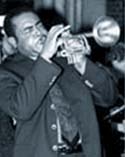
|
|
|
|
|
|
Photo Credit: Stephen Sullivan |
Terell Stafford
One of the beauties of Billy Taylor's Jazz at the Kennedy Center programs is the wide variety of guests Dr. Taylor welcomes to the show and introduces to NPR Jazz audiences. And one of Dr. Taylor's more laudable attributes is that his taste in artists spans the generations and he is all too happy to showcase newer, lesser known but deserving talents to his bandstand. Such is the case with this edition of the show as he hosts one of the best and brightest new trumpet voices to the Kennedy Center's Theater Lab, Terell Stafford. Though of the same generation as his peers Wynton Marsalis, Terence Blanchard, and Wallace Roney, Terell Stafford is a bit lesser known than they, but as the show clearly demonstrates, his big fat trumpet and flugelhorn tone and his immaculate articulation clearly place him in their company. In addition to brightening whatever bandstand he chooses, Terell Stafford is also currently teaching at Temple University. Early in the show, when Dr. Taylor asks Terell to elaborate on his evolution as a trumpeter, Terell draws chuckles from both host and audience as he relates how his parents insisted that if he were going to major in music -- heaven forbid -- it had to be tied to an education degree, being the child of a teaching mother. So he majored in classical trumpet and education. Classical training certainly helped shape Stafford's round, warm tone, which he demonstrates in spades joining Dr. Taylor's trio (with Winard Harper on drums and Chip Jackson on bass) for a rendition of "You Don't Know What Love Is." Stafford performs the tune on flugelhorn, big brother to the trumpet, prompting Dr. Taylor to inquire about the different qualities between trumpet and flugelhorn playing. Terell says that he enjoys playing flugelhorn because he can "....really sing through..." the instrument.
Further evidence of Stafford's lovely ballad prowess is offered by their rendition of "Old Devil Moon." The show's customary audience question and answer segment draws a query about Terell's study of composition. He tells how he didn't really study composition during college, but that he got invaluable lessons from alto saxman Bobby Watson when he joined the band Horizon. Seems Watson made him write songs related to various emotions -- happiness, sadness, anger, etc. -- which Stafford found very useful in developing his writing skills. The closing selection is a traditional jazz benchmark to test a player's skill, "Cherokee," and Stafford passes with flying colors.
|
|
| |
